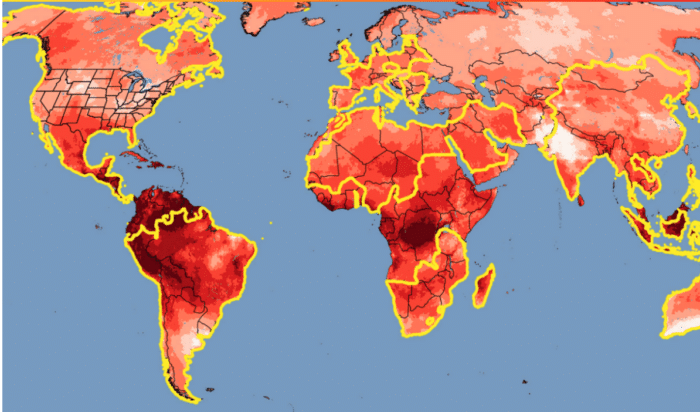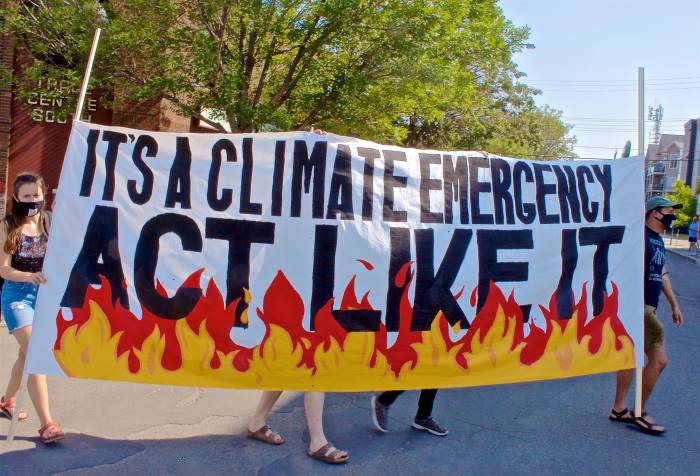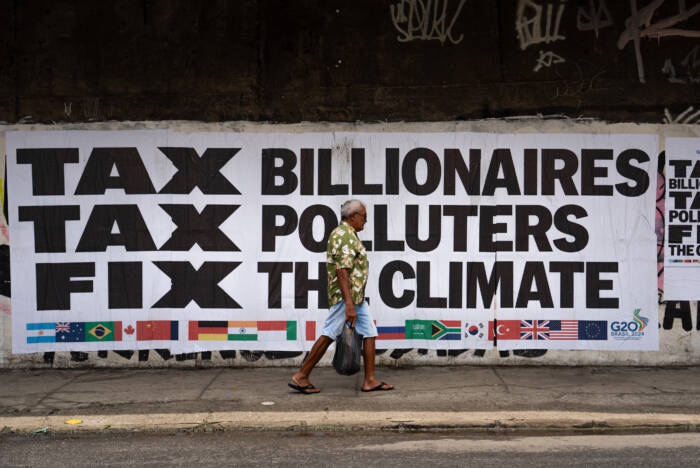In recent weeks the northern hemisphere has been ravaged by devastating heatwaves that have broken records and overwhelmed hospitals, all the result of human-induced climate breakdown.
From the US, to the UK, Europe, and East Asia, these events can no longer be considered anomalies, but continuations of a broader pattern: on every single day in 2024 – all 366 of them – some place on Earth experienced a heat emergency.

Between 2023 and 2024, human-caused climate change added an average of 26 days of extreme heat (on average, across all places in the world) than there would have been without a warmed planet. Source worldweatherattribution.org
On July 22 last year, the planet recorded its hottest day ever, with a global average temperature of 17.16°C. This relentless trend culminated in 2024 becoming the first year to exceed 1.5°C above pre-industrial levels.
Global heating is escalating at a worrying pace to say the least. At 350.org, we say “global heating”, not “warming”, when communicating about the climate emergency. “Warming” sounds too benign – it could be misconstrued as comforting. The reality is, the world is heating aggressively, and heating is a lethal, invisible killer.
And the boiling Earth — a predictable symptom of unchecked climate change — is uncovering not just another systemic sickness, but a comorbidity: unchecked and rising inequality.
The ultra-wealthy are fueling both inequality and the climate crisis by hoarding their vast fortunes, funding polluting industries, and dodging their tax responsibilities. Growing alongside the widening pool of global billionaires is a clearer-than-ever divide between how the billionaire and capital class plan to adapt to and capitalize from an overheating planet, and how everyday people are forced to weather climate impacts.
The global majority are facing rising energy bills, crumbling public services, and increasingly severe climate impacts. Yet, instead of holding the richest accountable, many governments continue to impose budget cuts that place the burden on everyday people, allowing extreme wealth to grow without limits.

Earlier this year — around the same time it was announced that Bezos’ Earth Fund was cutting ties with climate groups — it was reported that Wall Street, having resigned to a 3°C hotter world, is eyeing a 41% surge in the global air conditioning market as a growth and profit-making opportunity. Needless to say, this dystopian, laissez-faire reaction to the climate emergency does nothing for the billions of people who not only don’t live in air conditioning-laden-places, but who are already struggling to keep up with electricity bills.
For households that have it, day after day of relentless heat forces people to crank up their air conditioning units. But for low-income communities, who are grappling with a cost of living crisis, the burden of relying on them is both literal and financial. Just one higher than normal electricity bill can push a family into crisis.
As we move into the tail end of the 2025 Northern hemisphere summer, the emergencies are already overlapping. It’s highly likely that annual temperatures will breach 1.5°C again in the next five years, and for the first time ever, there is a low but statistical possibility we could breach 2°C by 2030.
Heat is silent in more than a literal way. Despite being the deadliest form of extreme weather, its toll is often underreported in the media. Heat is harder to visualize or conceptualize than a wildfire, flood, or hurricane – and perhaps because of this, we don’t give heatwaves names, they’re not conceived as specific objects, and thus don’t instill the same type of media-backed shock and awe or encourage preparedness.
There is a case to be made that the media isn’t yet ‘heat literate’. So it’s our responsibility in the climate advocacy community to change this: help the media, and media consumers, to understand that heat is not just a climate reporting issue. It’s a health, gender, agriculture, ecological, migrant justice, and labor issue — and crucially, it’s an inequality issue.
The connection between rising oligarchy and the climate emergency is starting to slowly pierce the media cycle. Earlier this year the report that the richest 1% are responsible for the same level of carbon emissions as nearly two-thirds of the global population, all while contributing very little in taxes, made global headlines. As deepening inequality is becoming undeniable — at this point, there seems to be little to no attempt to make it palatable — so too is the claim that there is no money for renewable energy, public housing, or basic services becoming simply ridiculous.
Introducing a tax on extreme wealth could raise hundreds of billions — even trillions — each year to fund a just climate transition. This revenue could be used to improve energy efficiency in homes, expand access to clean energy, overhaul transportation systems, and support global climate solutions. Around the world, more and more people are demanding that governments take bold action to rein in billionaire power and invest in a fairer, more sustainable future.

Some countries and states have mandatory protections for outdoor workers in the heat. In others, workers are unionizing to demand these protections: the 2024 heatwave in Greece spurred trade unions to demand paid time off when temperatures soar. But cracks in the system, widened by the current political climate, are exacerbating the dangers of extreme heat. In the U.S., cuts to the NOAA and weather monitoring agencies threaten our ability to track hurricanes and heat extremes.
As the world barrels past warming thresholds we can no longer afford to treat extreme heat as an invisible or secondary threat.
Now is the time to act. It’s time to tax the super-rich, hold polluters accountable, and create a society that puts people and the planet before profit. We must push our governments and financial institutions to honor and strengthen climate commitments; and at the local level, invest in cooling infrastructure, enforce worker protections, and support community-led adaptation powered by renewable energy. Every fraction of a degree we avoid, every life-saving measure we implement, matters.
The excuses have run out. A better world is possible, but only if we choose justice over greed.